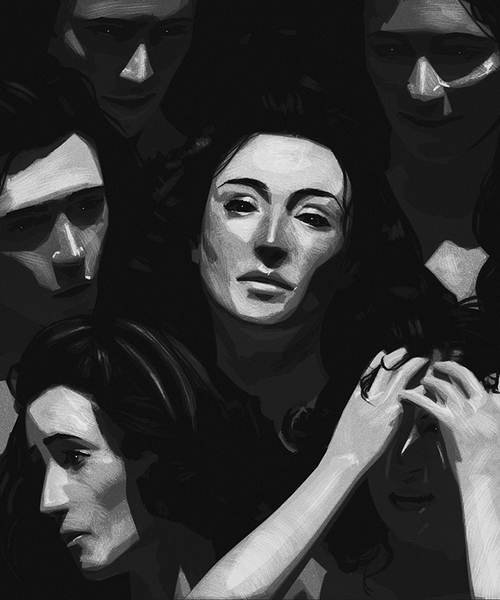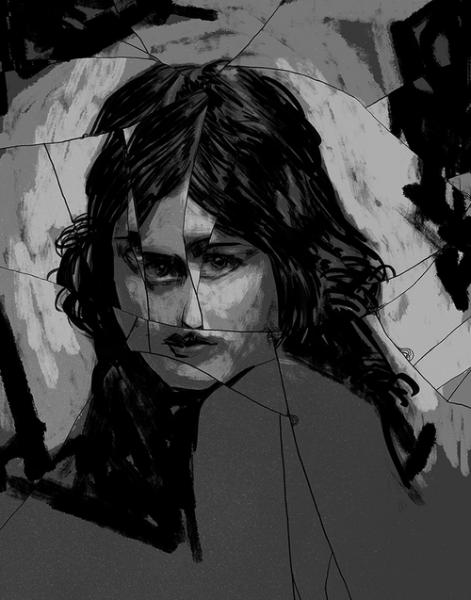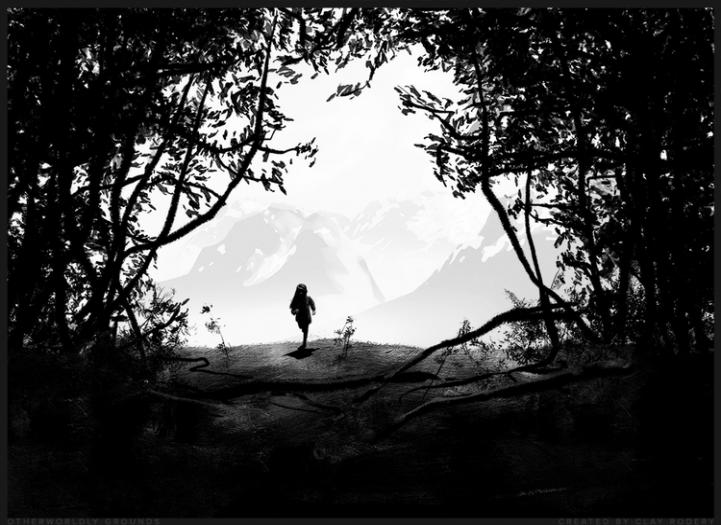On the 'The Hunger Artist' and Songs of the Isolationist

 “The Hunger Artist” is a poem from my manuscript-in-progress, Songs of the Isolationist. Songs explores various registers of isolationism—from a pregnant woman’s fear of the baby’s invasion of her body and mind to a naturalized citizen's fear of living in a nation where her outsider status seems not to be remediated through citizenship. Perhaps because of my own mixed heritage and my family’s nomadic habit of moving every three years when I was a child, my writing, before I became a mother, was highly decontextualized. I saw myself as a placeless, floating mind. I was born in Brazil of a Brazilian mother and an Indian father, and we emigrated from Brazil to the United States when I was four. In spite of having grown up in the American South, a region where my minority status was incontestable, I felt empowered by my mixed heritage. The fact that my family followed no single cultural script was liberating: I believed that any place could be my home. Looking back, I see that prior to becoming a mother, I regarded my body as a mere appendage of my mind. An anecdote to illustrate this mindset: at nine-months pregnant, I flew from Chicago to Vancouver, Canada for a job interview at the MLA convention, where academics and writers like myself are interviewed for teaching jobs. Though my OB/GYN was hesitant to go along with my travel plans, she seemed to know that any attempt to dissuade me would be akin to trying to stop the salmon from swimming upstream to spawn. I had researched all the hospitals in Vancouver and Seattle, and I made sure that our insurance plan would cover medical expenses if I happened to go into labor during the convention. But in spite of my planning for such possibilities, I was rather certain that the baby inside me would cooperate with my travel and interview plans. And luckily, she did.
“The Hunger Artist” is a poem from my manuscript-in-progress, Songs of the Isolationist. Songs explores various registers of isolationism—from a pregnant woman’s fear of the baby’s invasion of her body and mind to a naturalized citizen's fear of living in a nation where her outsider status seems not to be remediated through citizenship. Perhaps because of my own mixed heritage and my family’s nomadic habit of moving every three years when I was a child, my writing, before I became a mother, was highly decontextualized. I saw myself as a placeless, floating mind. I was born in Brazil of a Brazilian mother and an Indian father, and we emigrated from Brazil to the United States when I was four. In spite of having grown up in the American South, a region where my minority status was incontestable, I felt empowered by my mixed heritage. The fact that my family followed no single cultural script was liberating: I believed that any place could be my home. Looking back, I see that prior to becoming a mother, I regarded my body as a mere appendage of my mind. An anecdote to illustrate this mindset: at nine-months pregnant, I flew from Chicago to Vancouver, Canada for a job interview at the MLA convention, where academics and writers like myself are interviewed for teaching jobs. Though my OB/GYN was hesitant to go along with my travel plans, she seemed to know that any attempt to dissuade me would be akin to trying to stop the salmon from swimming upstream to spawn. I had researched all the hospitals in Vancouver and Seattle, and I made sure that our insurance plan would cover medical expenses if I happened to go into labor during the convention. But in spite of my planning for such possibilities, I was rather certain that the baby inside me would cooperate with my travel and interview plans. And luckily, she did.
It was only upon giving birth that I was forced to contend with the various concrete realities I’d previously sidelined in my mind—the job market’s indifference to my need for a job, my body’s ability to disobey my mind, my status as an outsider in relation to any monolithic culture. My writing, however, has gained a richness that it previously lacked as I now wrestle with these issues in my poems. Songs of the Isolationist explores the ways the body defies the mind and how the mind fights back or, on occasion, embraces the body’s desires. The mind’s quest for freedom in my poetry now exists in tension with the body and the world the body inhabits. Songs also investigates identity’s relation to place.
 Shortly after my daughter was born, I moved from Chicago, where I had been living for eight years, to the area on the border of Nebraska, Iowa, and South Dakota. I found myself surrounded by an insular culture that reminded me of my days in the South, the region I had deliberately fled as an 18-year old. In my new role as a Visiting Assistant Professor at the University of South Dakota, I taught students who wrote papers belittling immigrants who didn’t speak English. I was afraid their ideologies represented the future of our country—a future I wanted to abolish for the country’s sake and for my own, but the 2016 election made these fears more intense. My poetry after becoming a mother explores all of these ideas—the difficulty of raising a multiethnic child so that she does not marginalize the cultures of her nonwhite parent, the difficulty of achieving self-determination rather than living where health insurance and other forms of security make themselves available, the difficulty of creating a culture in one’s home that defies the culture outside of it. I now welcome these topics into my poetry, and I am thankful that my daughter has opened my world to make me see all of these realities as worthy of poetry. Poems from Songs of the Isolationist have appeared or are forthcoming in Feminist Studies, The Journal, Prairie Schooner, Reservoir, and Fugue.
Shortly after my daughter was born, I moved from Chicago, where I had been living for eight years, to the area on the border of Nebraska, Iowa, and South Dakota. I found myself surrounded by an insular culture that reminded me of my days in the South, the region I had deliberately fled as an 18-year old. In my new role as a Visiting Assistant Professor at the University of South Dakota, I taught students who wrote papers belittling immigrants who didn’t speak English. I was afraid their ideologies represented the future of our country—a future I wanted to abolish for the country’s sake and for my own, but the 2016 election made these fears more intense. My poetry after becoming a mother explores all of these ideas—the difficulty of raising a multiethnic child so that she does not marginalize the cultures of her nonwhite parent, the difficulty of achieving self-determination rather than living where health insurance and other forms of security make themselves available, the difficulty of creating a culture in one’s home that defies the culture outside of it. I now welcome these topics into my poetry, and I am thankful that my daughter has opened my world to make me see all of these realities as worthy of poetry. Poems from Songs of the Isolationist have appeared or are forthcoming in Feminist Studies, The Journal, Prairie Schooner, Reservoir, and Fugue.
Recommended
Nor’easter
Post-Op Appointment With My Father
Cedar Valley Youth Poet Laureate | Fall 2024 Workshop






